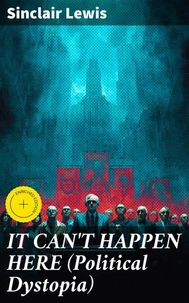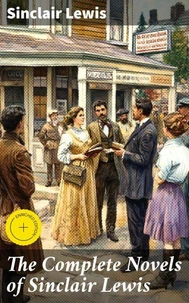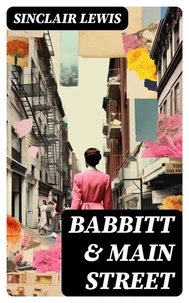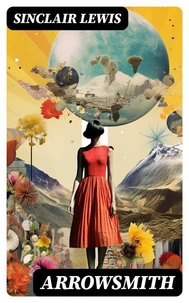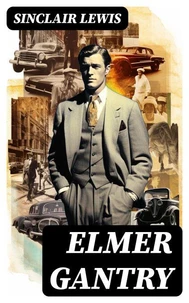Main Street & Babbitt
Par :Formats :
Disponible dans votre compte client Decitre ou Furet du Nord dès validation de votre commande. Le format ePub est :
- Compatible avec une lecture sur My Vivlio (smartphone, tablette, ordinateur)
- Compatible avec une lecture sur liseuses Vivlio
- Pour les liseuses autres que Vivlio, vous devez utiliser le logiciel Adobe Digital Edition. Non compatible avec la lecture sur les liseuses Kindle, Remarkable et Sony
 , qui est-ce ?
, qui est-ce ?Notre partenaire de plateforme de lecture numérique où vous retrouverez l'ensemble de vos ebooks gratuitement
Pour en savoir plus sur nos ebooks, consultez notre aide en ligne ici
- Nombre de pages800
- FormatePub
- ISBN859-65--4776556-1
- EAN8596547765561
- Date de parution26/12/2023
- Protection num.Digital Watermarking
- Taille1 Mo
- Infos supplémentairesepub
- ÉditeurDIGICAT
Résumé
Sinclair Lewis's "Main Street" and "Babbitt" stand as seminal critiques of early 20th-century American life, exploring the tension between individual desires and societal expectations. In "Main Street, " Lewis employs a keen realist style to expose the narrow-mindedness of small-town America through the eyes of Carol Kennicott, whose idealistic vision clashes with the conformist values of Gopher Prairie.
Conversely, "Babbitt" adopts a satirical tone to depict the life of George Babbitt, a middle-class businessman, unraveling the hollowness of the American Dream amid rampant consumerism and social conformity. Together, these works illuminate the struggles of self-identity in an increasingly commercialized society. Sinclair Lewis, the first American author awarded the Nobel Prize for Literature, possessed a fervent critique of American culture shaped by his own Midwestern roots.
His experiences in small towns and academic environments provided fertile ground for his exploration of social conformity and disillusionment. His keen observations on middle-class American values and the moral dilemmas faced by individuals uniquely positioned him to dissect these themes with both empathy and incisiveness. For readers seeking an unflinching look at 20th-century American society through the lens of sharp wit and keen observation, both "Main Street" and "Babbitt" are invaluable.
Lewis's rich characters and incisive social critique not only resonate with historical significance but also provoke contemporary reflections on the perennial struggle between individuality and societal pressure.
Conversely, "Babbitt" adopts a satirical tone to depict the life of George Babbitt, a middle-class businessman, unraveling the hollowness of the American Dream amid rampant consumerism and social conformity. Together, these works illuminate the struggles of self-identity in an increasingly commercialized society. Sinclair Lewis, the first American author awarded the Nobel Prize for Literature, possessed a fervent critique of American culture shaped by his own Midwestern roots.
His experiences in small towns and academic environments provided fertile ground for his exploration of social conformity and disillusionment. His keen observations on middle-class American values and the moral dilemmas faced by individuals uniquely positioned him to dissect these themes with both empathy and incisiveness. For readers seeking an unflinching look at 20th-century American society through the lens of sharp wit and keen observation, both "Main Street" and "Babbitt" are invaluable.
Lewis's rich characters and incisive social critique not only resonate with historical significance but also provoke contemporary reflections on the perennial struggle between individuality and societal pressure.
Sinclair Lewis's "Main Street" and "Babbitt" stand as seminal critiques of early 20th-century American life, exploring the tension between individual desires and societal expectations. In "Main Street, " Lewis employs a keen realist style to expose the narrow-mindedness of small-town America through the eyes of Carol Kennicott, whose idealistic vision clashes with the conformist values of Gopher Prairie.
Conversely, "Babbitt" adopts a satirical tone to depict the life of George Babbitt, a middle-class businessman, unraveling the hollowness of the American Dream amid rampant consumerism and social conformity. Together, these works illuminate the struggles of self-identity in an increasingly commercialized society. Sinclair Lewis, the first American author awarded the Nobel Prize for Literature, possessed a fervent critique of American culture shaped by his own Midwestern roots.
His experiences in small towns and academic environments provided fertile ground for his exploration of social conformity and disillusionment. His keen observations on middle-class American values and the moral dilemmas faced by individuals uniquely positioned him to dissect these themes with both empathy and incisiveness. For readers seeking an unflinching look at 20th-century American society through the lens of sharp wit and keen observation, both "Main Street" and "Babbitt" are invaluable.
Lewis's rich characters and incisive social critique not only resonate with historical significance but also provoke contemporary reflections on the perennial struggle between individuality and societal pressure.
Conversely, "Babbitt" adopts a satirical tone to depict the life of George Babbitt, a middle-class businessman, unraveling the hollowness of the American Dream amid rampant consumerism and social conformity. Together, these works illuminate the struggles of self-identity in an increasingly commercialized society. Sinclair Lewis, the first American author awarded the Nobel Prize for Literature, possessed a fervent critique of American culture shaped by his own Midwestern roots.
His experiences in small towns and academic environments provided fertile ground for his exploration of social conformity and disillusionment. His keen observations on middle-class American values and the moral dilemmas faced by individuals uniquely positioned him to dissect these themes with both empathy and incisiveness. For readers seeking an unflinching look at 20th-century American society through the lens of sharp wit and keen observation, both "Main Street" and "Babbitt" are invaluable.
Lewis's rich characters and incisive social critique not only resonate with historical significance but also provoke contemporary reflections on the perennial struggle between individuality and societal pressure.


